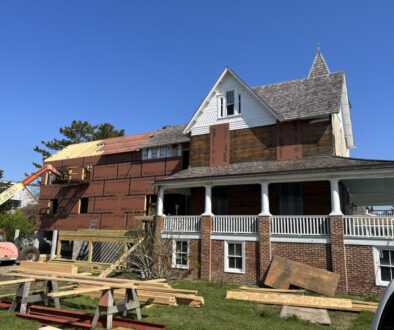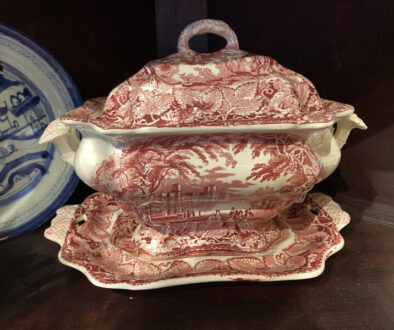The Musical Marriage of Herb Moore & Terry Dougherty

If you’ve spent any time in Cape May over the past two and a half decades, chances are you’ve heard them—maybe while sipping a martini at Congress Hall’s Brown Room, watching a summer sunset from their veranda, or even strolling past a house where jazz guitar and upright bass drift out from the garage. The music of guitarist Herb Moore and bassist Terry Dougherty makes for a perpetual duo and occasional trio that has been heard at nearly every local venue that is or has been.
“We made a list one time of all the venues in Cape May,” Terry recalls. “Between weddings and private parties, I think we’ve played at almost every spot in town.”
The two have developed the kind of musical bond that doesn’t require rehearsal or a setlist. They finish each other’s stories and solos alike. And they carry with them a trove of anecdotes so expansive that one story seems to unlock three more.
“As a partnership for 25 years, it’s a musical marriage,” says Terry. “When we play together, I just know where he’s going. I hear his cues; It’s just about listening. We don’t even count off songs. We are in tune with each other.”
The Night It All Began
Terry and Herb first played together in 2000 at the now-defunct Pelican Club, previously perched atop the Marquis de Lafayette Hotel. “I got a call to substitute on this one particular gig, and it became a permanent thing,” says Herb. “Eventually, the band leader got fired by the venue and Terry managed to convince them to let the two of us stay.”
This regular gig was the birthplace of the earliest shared memories between the two, from which many more were to come. The challenging conditions of loading in gear to the sixth floor was bonding in disguise, “You had to go all the way to the top of the Marquis, get off the smelly elevator, wheel our stuff through the kitchen, down the bar, which was like 80 feet long, so it was quite the load-in,” says Herb.
They made do in a tight space reserved for performance where passersby often caused interruption. “Once at a gig, somebody would kick the cable out of the wall,” Herb laughs. “I’d have to go down, plug it in, start playing, stop playing…”
Despite the obstacles they saw it through and played for the next five years, including at the club’s final night, New Year’s Eve in 2005.
A New Voice
Around the year 2002, the duo became a trio by joining forces with vocalist Rachel Husta. The singer was brought in by Herb, who had played in a previous group with her. The shift brought a new musical dynamic and audience appeal.
“We were playing basically jazz standards before,” Herb explains. “But once she joined and we started doing vocal tunes it opened up the door for Terry to sing too. He’s got a lovely Irish tenor voice, so now we had two people singing and we could do harmonies. It gave me a break too—I didn’t have to solo non-stop all night.”
The benefits were new and exciting. Their set lists expanded to include recognizable tunes and covers of Diana Krall, Norah Jones, and even harmonies of Michael Bublé. “Rachel is a wonderful singer,” Terry enthused. “She’s just got this natural voice. Not flashy, not diva-ish at all. Just a beautiful voice.”

Rachel performed with them until around 2006. By 2008, following the recession, the duo format landed gigs out of necessity and practicality. “Rachel left, and we were able to find work as a duo because it was less money,” says Terry. “I think there was an economic factor. The duo has worked for us ever since.”
Though they no longer regularly perform with Rachel, she did return for a special appearance at a garage concert in 2023 in celebration of Terry and Herb’s silver jubilee of playing together.
“It was our 25th year playing together, and also the 10th international Play on the Porch Day,” says Terry. “I built a little stage in my garage, and we played a set. Rachel came and sang a couple songs with us.”
Like Hearing Music for the First Time
After the Pelican Club, the pair bounced around town and found a new residency at Congress Hall, performing regularly in the Brown Room and on the veranda—an idyllic venue that would host them for a decade of summer seasons. “That was 10 years straight,” says Terry. “Every Sunday in the summer. We never got rained on once.”
Herb comments, “There was one little storm, but it passed. Sometimes those were the best nights—people were stuck under the veranda and couldn’t go anywhere. So, they had to listen to us!”
After countless gigs at the same venue, you may think you know what to expect—until something remarkable jolts the jazz right out of you. “This lady came up to us in tears,” recalls Terry. “She had been deaf her whole life and had just had an ear operation. It was the first music she ever heard. And we were the music she was hearing.”
“She had some type of implant,” adds Herb. “Her husband brought her out so she could hear music for the first time. That was amazing.”
For Terry and Herb, moments like these epitomize the connecting power of their craft. “That’s one of the things about being a musician,” Terry reflects. “Sometimes you’re wallpaper. But you don’t realize—someone might be really listening.”
Dividing the Work
The duo might appear effortless on stage in their flow state, but they maintain a strong work ethic and clear division of labor. “Herb is the musical director of this relationship,” says Terry. “He does the arrangements. Every year we try to add a couple songs to the repertoire. I do most of the booking. There’s always open communication.”
Terry reveres his partner’s musical prowess as world class. “Herb is a guitarist’s guitarist. When we do gigs and there are other guitar players in the audience, they get mesmerized. They understand the proficiency he has.”
The two play together most often but do have professional musical pursuits outside of their duo. Though Herb plays gigs exclusively with Terry, he has his own off-season hustle. “My sons were all involved in the Absegami music and theater programs. They inspired me to get involved and for the last 15 years or so, I’ve been a pit musician for the local high schools and regional theater productions.”
Terry is active in the Cape May music scene. “Herb has always been my priority, but I have worked with some others as well,” he explained. He regularly performs with local legendary guitarist Geno White and participates in the tribute concerts produced by Marnie Lengle alongside other local musicians. “I also very proudly have opened the Cape May Jazz festival for two years with some amazing jazz musicians.”
Honoring the Past and Moving Forward
These days, they’ve broadened their sound, combining classic jazz sensibilities with more modern flair. “We started doing more contemporary arrangements of pop songs with a jazz flavor,” says Terry. “Our niche has kind of evolved. The Great American Songbook was our parents’ and grandparents’ music. Now we do Joni Mitchell, The Police, and jazzy Beatles tunes.”
“Most of what we do now, maybe two-thirds, is not considered jazz standards,” adds Herb. “But every song we do has some element of improv. A die-hard jazz group might not consider us jazz, but that improvisation—that’s the main element of jazz, and it’s there.”
When there is another instrument at play, it keeps things interesting. Over the years, they’ve brought in exceptional third members when the occasion allows. “We’ve had the honor to share the stage with world class musicians like George Mesterhazy; we did memorable gigs with him,” says Terry. They have also notably played with Barry Miles, Brian Betts, Greg Pordon, and Herb’s son Henry.
Strings and Sentiment
The depth of their friendship and shared experience is impossible to quantify. “We’ve watched each other’s kids grow and gone through all of our life’s moments in the last 25 years,” Terry says. “Herb and I not just became fast friends—we became family.”
To find upcoming gigs or book them for a private event visit herbmoorejazz.com.



